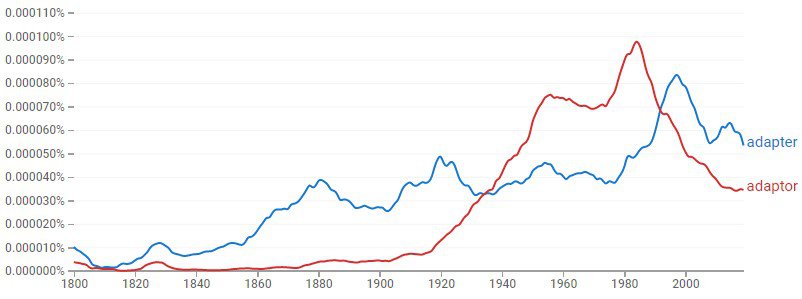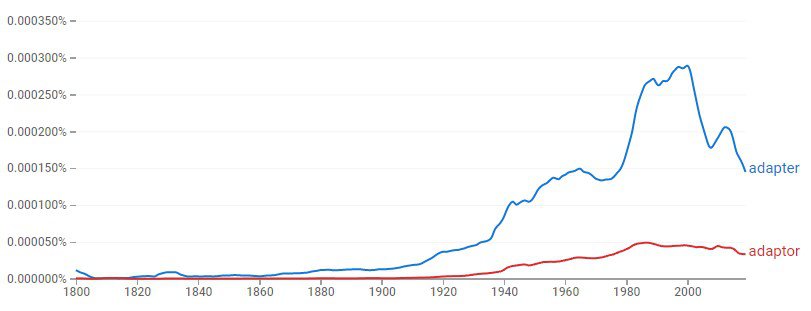It would be nice to be able to draw a distinction between adapter and adaptor, but they are used interchangeably in all varieties of English and in all their meanings, which include (1) a device that enables normally incompatible devices to work together, (2) one who adapts to new conditions, and (3) one who adapts a work of art for a different style or medium. Searching the web, we find all sorts of claims about the differences between the words, but these seem to reflect the writers’ own preferences rather than any examination of how the words are actually used. In real-world usage, including in edited news publications, both words are often used for people, and both are often used for electric devices.
We are each free to draw our own distinctions, of course. And there are certainly trends. For instance, British writers seem to favor adaptor for electric devices and adapter for people (and the Guardian‘s style book makes the distinction explicit), but exceptions abound (even in the Guardian—see below). Both words originated in the mid-18th century—though the OED says adaptor came slightly later—and neither spelling is American or British. North American writers use adaptor less often than everyone else, but, again, both words are used everywhere.
Examples
This guide assumes the user already has bought a case, cover, sleeve or pouch, a warranty and a power adapter (if it was not included). [New York Times] Avgiris said getting the service will involve a simple kit comprising a small adaptor box, a high-definition video webcam and a remote control. [Chicago Tribune] [T]he remaining cast, adaptor and director are unidentified. [Guardian] It was conceived after Choi bought the ultra-slim Apple MacBook Air laptop, and wanted a similarly thin, stylish adapter for it [Telegraph] Being an ultrabook, VGA and HDMI connectivity is supplied via dongles and Asus bundles a USB to Ethernet adapter for 10/100 wired networking. [New Zealand Herald] His lively nature, ability to synthesize difficult arguments and early-adapter command of social media and technology marked him out. [Globe and Mail]
Ngram

This ngram graphs the use of adapter and adaptor in British books published from 1800 to 2000. It shows that adaptor had a brief prevalence in the late 20th century, but that adapter has generally been preferred.

And this ngram graphs the words’ use in American books during the same period: Of course, it’s hard to draw useful conclusions from these Ngrams because they don’t chart how the words are used, but they at least help prove wrong the assertion that adapter is American and adaptor is British.
Comments are closed.